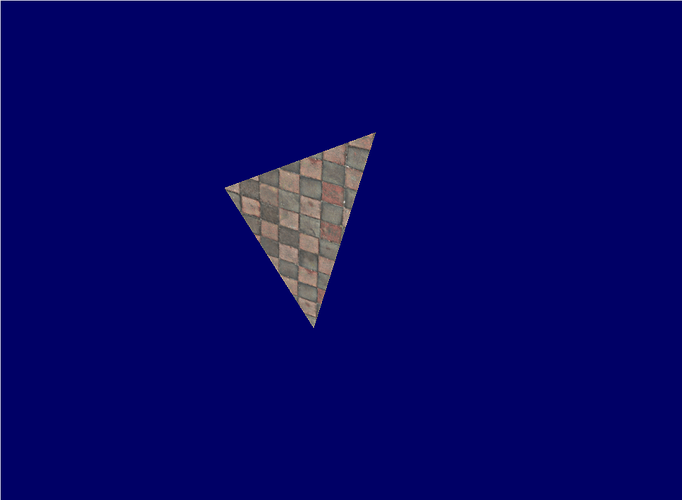Hello to everyone,
In last two days i have trouble with indices and i am stuck… I exported very simple plane from blender in OBJ format.
I wrote very simple and straightforward parser, looks like this:
FILE *fp = fopen(path, "r");
if(fp == NULL){
printf("Model load error: %s\n", path);
}
char tmpc[100];
int v_count = 0;
int vt_count = 0;
int vn_count = 0;
int fv_count = 0;
int fvt_count = 0;
int fvn_count = 0;
/* get v,vt and vn data */
while(1){
if( fscanf(fp, "%s", tmpc) == EOF ){
break;
}
if(strcmp(tmpc, "v") == 0){
fscanf(fp, "%f", &ve.v[v_count]);
v_count++;
fscanf(fp, "%f", &ve.v[v_count]);
v_count++;
fscanf(fp, "%f", &ve.v[v_count]);
v_count++;
}
if(strcmp(tmpc, "vt") == 0){
fscanf(fp, "%f", &ve.vt[vt_count]);
vt_count++;
fscanf(fp, "%f", &ve.vt[vt_count]);
vt_count++;
fscanf(fp, "%f", &ve.vt[vt_count]);
vt_count++;
}
if(strcmp(tmpc, "vn") == 0){
fscanf(fp, "%f", &ve.vn[vn_count]);
vn_count++;
fscanf(fp, "%f", &ve.vn[vn_count]);
vn_count++;
fscanf(fp, "%f", &ve.vn[vn_count]);
vn_count++;
}
if(strcmp(tmpc, "f") == 0){
fscanf(fp, "%d/%d/%d", &ve.fv[fv_count], &ve.fvt[fvt_count], &ve.fvn[fvn_count]);
fv_count++; fvt_count++; fvn_count++;
fscanf(fp, "%d/%d/%d", &ve.fv[fv_count], &ve.fvt[fvt_count], &ve.fvn[fvn_count]);
fv_count++; fvt_count++; fvn_count++;
fscanf(fp, "%d/%d/%d", &ve.fv[fv_count], &ve.fvt[fvt_count], &ve.fvn[fvn_count]);
fv_count++; fvt_count++; fvn_count++;
}
}
}
glGenBuffers(1, &ve.VBO);
glBindBuffer(GL_ARRAY_BUFFER, ve.VBO);
glBufferData(GL_ARRAY_BUFFER, sizeof(ve.v), ve.v, GL_STATIC_DRAW);
glGenBuffers(1, &ve.EBO); */
glBindBuffer(GL_ELEMENT_ARRAY_BUFFER, ve.EBO);
glBufferData(GL_ELEMENT_ARRAY_BUFFER, sizeof(ve.fv), ve.fv, GL_STATIC_DRAW);
ve.v_size = sizeof(GLfloat) * v_count;
ve.vt_size = sizeof(GLfloat) * vt_count;
ve.vn_size = sizeof(GLfloat) * vn_count;
ve.fv_size = sizeof(GLfloat) * fv_count;
ve.fvt_size = sizeof(GLfloat) * fvt_count;
ve.fvn_size = sizeof(GLfloat) * fvn_count;
// TODO, use ve.x_count variables directly in here, discard local x_count;
ve.v_count = v_count;
ve.vt_count = vt_count;
ve.vn_count = vn_count;
ve.fv_count = fv_count;
ve.fvt_count = fvt_count;
ve.fvn_count = fvn_count;
Every file i threw at it loaded just fine, i checked many times in lldb debugger to see actual values in variables during runtime and everything is fine.
And i render my stuff with this:
void visualEntityRender(visualEntity *ve, GLuint type){
glClear(GL_COLOR_BUFFER_BIT | GL_DEPTH_BUFFER_BIT);
glBindBuffer(GL_ARRAY_BUFFER, ve->VBO);
glBindBuffer(GL_ELEMENT_ARRAY_BUFFER, ve->EBO);
glEnableVertexAttribArray(ve->shaderID);
glVertexAttribPointer( ve->shaderID, 3,
GL_FLOAT, GL_FALSE,
0, (void *)0 );
switch(type){
case GL_ARRAY_BUFFER: goto ARRAY; break;
case GL_ELEMENT_ARRAY_BUFFER: goto ELEMENTS; break;
default: printf("Uknown rendering type.\n"); goto END; break;
}
ARRAY:
glDrawArrays(GL_TRIANGLES, 0, ve->v_count);
goto END;
ELEMENTS:
glDrawElements(GL_TRIANGLES, ve->fv_count, GL_UNSIGNED_INT, (void*)0);
END:
glBindBuffer(GL_ARRAY_BUFFER, 0);
glBindBuffer(GL_ELEMENT_ARRAY_BUFFER, 0);
glDisableVertexAttribArray(ve->shaderID);
}
Result is this is failure:
So the question is, where am i making mistake? I recently started OpenGL 4, everything goes smoothly including matrix transformations, textures etc… except this… Thank you very much in advance for your time. Feel free to ask me for any part of code you are interested in, also debugger output etc…
